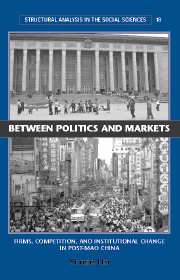Book contents
- Frontmatter
- Contents
- Tables and Figures
- Acknowledgments
- Introduction: Economic Market and Political Market
- 1 Chinese Industrial Enterprises: A Bird's-Eye View
- 2 Central Planning and Its Decline
- 3 The Rugged Terrain of Competition
- 4 Referee as Player: Menaces and Opportunities for Industrial Firms
- 5 Erosion of Authority Relations: A Tale of Two Localities
- 6 Favor Seeking and Relational Constraints
- 7 Competition, Economic Growth, and Latent Problems
- Conclusion
- Appendix A Statistical Data Sources
- Appendix B Methodological Note on Case Studies
- Bibliography
- Index
4 - Referee as Player: Menaces and Opportunities for Industrial Firms
Published online by Cambridge University Press: 15 July 2009
- Frontmatter
- Contents
- Tables and Figures
- Acknowledgments
- Introduction: Economic Market and Political Market
- 1 Chinese Industrial Enterprises: A Bird's-Eye View
- 2 Central Planning and Its Decline
- 3 The Rugged Terrain of Competition
- 4 Referee as Player: Menaces and Opportunities for Industrial Firms
- 5 Erosion of Authority Relations: A Tale of Two Localities
- 6 Favor Seeking and Relational Constraints
- 7 Competition, Economic Growth, and Latent Problems
- Conclusion
- Appendix A Statistical Data Sources
- Appendix B Methodological Note on Case Studies
- Bibliography
- Index
Summary
Differential treatment of firms is only a partial feature of state action in the new economic game. An important development in the reform is that increasing numbers of state agents have directly engaged in profit-seeking activities. In other words, the referees have not only bent the rules according to their own preferences but have also become active players themselves. The intensification of this entrepreneurial pursuit in the reform has led to a reprioritization of the allocative and regulatory decisions of state agents, which has had an important impact on the ability of industrial firms to compete and on economic institutional change.
In this chapter, I examine how industrial firms' profit-seeking activities have been affected by those of state agents. My focus centers on the interaction between regular industrial firms and front organizations used by state agents in pursuit of profits. The latter have been set up, run, or facilitated by state agencies outside the scope of their regular administrative functions and budgets since the mid-1980s. Mostly registered as independent public enterprises in the tertiary sector, such economic entities are managed by former or incumbent officials or the persons they trust. They receive funding and favorable regulatory treatment from, or with the help of, their government sponsors, and contribute a significant part of their revenue to the slush funds of the latter.
- Type
- Chapter
- Information
- Between Politics and MarketsFirms, Competition, and Institutional Change in Post-Mao China, pp. 98 - 121Publisher: Cambridge University PressPrint publication year: 2001

